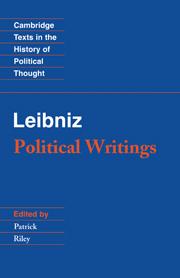Book contents
- Frontmatter
- Contents
- Preface to the Second Edition
- Abbreviations
- Introduction
- Part I On Justice and Natural Law
- Part II On Social Life, Enlightenment and the Rule of Princes
- Part III On State-Sovereignty and Hobbesian Ideas
- Part IV On the Defense of Hapsburg Europe against France
- Part V On International Relations and International Law
- Part VI Political Letters
- Part VII Sovereignty and Divinity: Unpublished Manuscripts, 1695–1714
- 15 An Unpublished Manuscript of Leibniz on the Allegiance Due to Sovereign Powers (1695)
- 16 Leibniz' Unpublished Remarks on Abbé Bucquoi: Divinity and Sovereignty (1711)
- 17 An Unpublished Lecture by Leibniz on the Greeks as Founders of Rational Theology: Its Relation to His ‘Universal Jurisprudence’ (1714)
- Critical Bibliography
- Index
15 - An Unpublished Manuscript of Leibniz on the Allegiance Due to Sovereign Powers (1695)
Published online by Cambridge University Press: 05 June 2012
- Frontmatter
- Contents
- Preface to the Second Edition
- Abbreviations
- Introduction
- Part I On Justice and Natural Law
- Part II On Social Life, Enlightenment and the Rule of Princes
- Part III On State-Sovereignty and Hobbesian Ideas
- Part IV On the Defense of Hapsburg Europe against France
- Part V On International Relations and International Law
- Part VI Political Letters
- Part VII Sovereignty and Divinity: Unpublished Manuscripts, 1695–1714
- 15 An Unpublished Manuscript of Leibniz on the Allegiance Due to Sovereign Powers (1695)
- 16 Leibniz' Unpublished Remarks on Abbé Bucquoi: Divinity and Sovereignty (1711)
- 17 An Unpublished Lecture by Leibniz on the Greeks as Founders of Rational Theology: Its Relation to His ‘Universal Jurisprudence’ (1714)
- Critical Bibliography
- Index
Summary
Leibniz' commentary on William Sherlock's The Case of the Allegiance Due to Soveraign Powers – which is published here through the generous permission of the Leibniz-Archiv at the Niedersächsische Landesbibliothek in Hanover – does not revolutionize one's view of his political philosophy; but it does provide us with a ‘new’ and wholly characteristic political letter which has the merit of helping to complete his most important correspondence dealing with theoretical and practical politics, the Briefwechsel with the Scottish nobleman Thomas Burnett. This exchange of letters, which extended from 1695 to 1713; contains some of Leibniz' most significant political passages, including one that has no parallel anywhere in his writings: ‘The end of political science with regard to the doctrine of forms of commonwealths, must be to make the empire of reason flourish … Arbitrary power is what is directly opposed to the empire of reason… Thus one must think in this world of laws which can serve to restrain not only kings, but also the deputies of the people, and judges.’ The letters to Burnett also contain characteristic observations on Hobbes, Locke, Harrington, Grotius, Plato and Aristotle, as well as good popular statements of Leibniz' theodicy and monadology. And in a writer like Leibniz, who put some of his principal thoughts into an endless flow of letters with hundreds of correspondents, a ‘new’ letter means more than it might in many cases.
- Type
- Chapter
- Information
- Leibniz: Political Writings , pp. 199 - 217Publisher: Cambridge University PressPrint publication year: 1988



